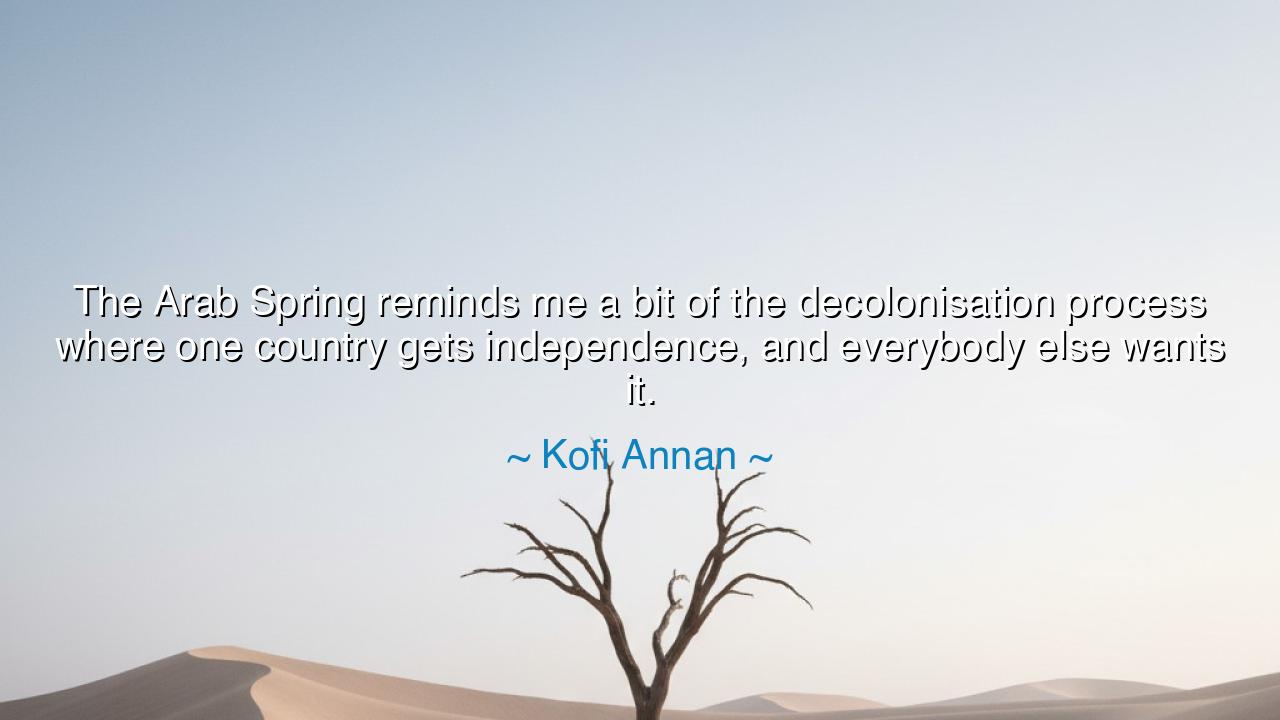
The Arab Spring reminds me a bit of the decolonisation process
The Arab Spring reminds me a bit of the decolonisation process where one country gets independence, and everybody else wants it.






“The Arab Spring reminds me a bit of the decolonisation process where one country gets independence, and everybody else wants it.” Thus spoke Kofi Annan, the wise and steady voice of a world often caught between its ideals and its fears. A son of Ghana, born amidst the awakening of Africa’s own struggle for independence, Annan understood not only the politics of liberation but the spirit that drives it — the yearning that dwells deep within all people to be free. His words are not merely an observation of history repeating itself, but a reflection on the contagion of hope, the sacred fire that leaps from one heart to another, from one nation to the next, once the first has dared to kindle it.
To understand his meaning, we must remember both the Arab Spring and the age of decolonisation — two eras separated by time but united by their human essence. In the early years of the twenty-first century, the people of Tunisia rose in revolt against tyranny. What began with the self-immolation of a humble street vendor, Mohamed Bouazizi, who could no longer bear the weight of corruption and humiliation, became a spark that ignited the Arab world. Tunisia overthrew its dictator, and the cry for freedom swept across Egypt, Libya, Yemen, and Syria. Just as in the mid-twentieth century, when one colonized nation after another broke free from imperial chains, so too did the Arab peoples see in Tunisia’s triumph the proof that liberation was possible — that independence, whether from foreign empire or domestic despot, was a flame that could be shared.
Kofi Annan, who lived through the dawn of African self-determination, saw in these uprisings the reflection of his own continent’s journey. When Ghana, under the leadership of Kwame Nkrumah, gained its independence from British rule in 1957, it was not merely a local victory — it was the first crack in the wall of empire. Nkrumah declared, “Our independence is meaningless unless it is linked up with the total liberation of Africa.” And indeed, his nation’s freedom awakened the sleeping courage of others — Nigeria, Kenya, Tanzania, Senegal, and beyond. One by one, the colonial powers fell away, not because they wished to, but because the hearts of the people had awakened to the truth that freedom once witnessed can never again be forgotten. Annan saw this same pattern echo through the sands of the Middle East — the chain reaction of hope.
But Annan also knew, as only the wise can know, that freedom’s first bloom often carries the seeds of struggle. For both in decolonisation and in the Arab Spring, the fall of tyranny did not guarantee the rise of peace. In many lands, the overthrow of one power made way for chaos, division, or new forms of oppression. Just as postcolonial Africa faced the burdens of nation-building — tribal conflict, corruption, economic dependency — so too did nations like Libya and Syria fall into the abyss of internal war after their revolutions. Annan’s words, therefore, carry both admiration and caution: he celebrates the courage of awakening, but warns that the dawn of freedom demands the discipline of wisdom. Independence without preparation can be as perilous as servitude without resistance.
The ancients too spoke of this cycle — the eternal rhythm of liberation and consequence. When Moses led his people out of Egypt, their journey to freedom was not a single act, but a generation-long trial through the wilderness. They escaped their chains, yet their hearts still bore the memory of bondage. In the same way, the Arab Spring and the decolonisation movements were not mere events but passages — pilgrimages from fear to freedom, from oppression to uncertainty. Annan, who devoted his life to peace among nations, reminds us that the pursuit of liberty is both a right and a responsibility, for to win freedom is easy compared to the art of sustaining it.
And yet, there is something magnificent in this human pattern. That one act of bravery can awaken thousands; that one small nation can light a torch bright enough to guide a continent. Whether it was Ghana in 1957 or Tunisia in 2011, these moments remind us that the desire for self-rule, for dignity, and for a voice in one’s destiny is woven into the very fabric of humanity. Empires may rise and fall, tyrants may come and go, but the cry for independence — for freedom from domination, whether by sword or fear — will always find its echo in the hearts of the oppressed.
So, my child of history and conscience, take this lesson from Kofi Annan’s wisdom: freedom spreads like fire, but it must be tended like a garden. Do not fear the awakening of others — rejoice in it, for every act of liberation strengthens the whole of humankind. Yet remember that revolution is but the first breath of a long life; what follows must be guided by justice, unity, and patience. When one people rise, let others rise with them, not to destroy, but to build. For as Annan teaches, the story of one nation’s freedom is the story of all nations — and the destiny of all people is not domination, but dignity.
And thus, as the ancients might say: cherish liberty, but wield it with wisdom. The flame that burns for freedom can either illuminate or consume — it is ours to choose which.






AAdministratorAdministrator
Welcome, honored guests. Please leave a comment, we will respond soon